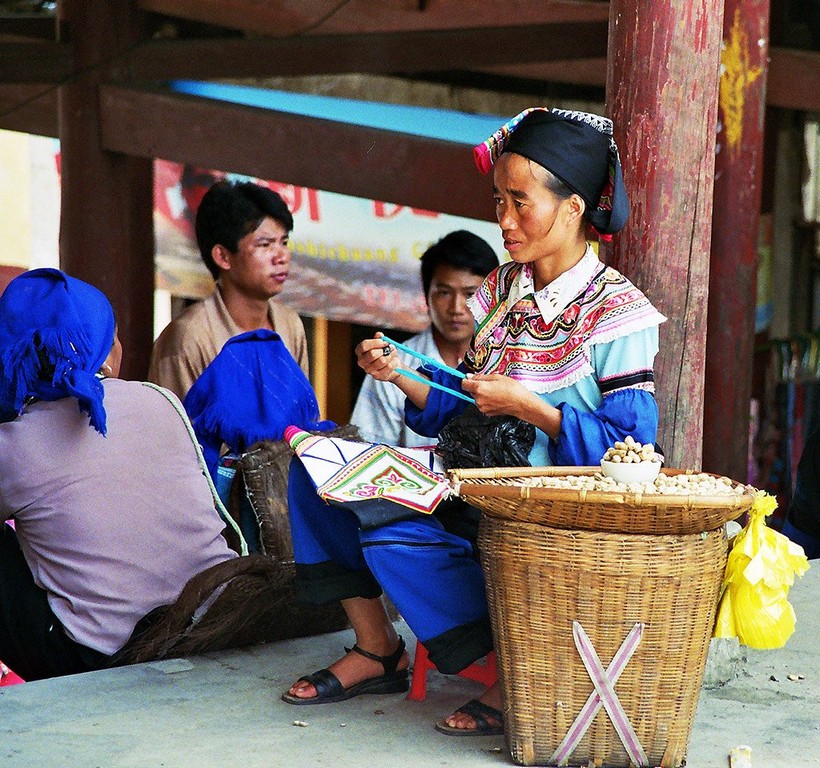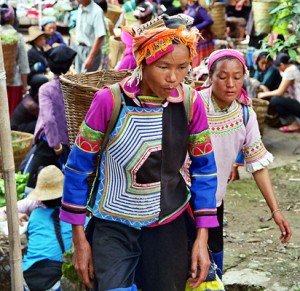Photo of the Week:
Yuanyang Market 元阳市场
This Photo was taken in Yuanyang Market 元阳市场 Yunnan Province 云南省 in 2006.
It shows a women from the Hani minority 哈尼族 knitting while waiting to sell peanuts

Your blog to China
This Photo was taken in Yuanyang Market 元阳市场 Yunnan Province 云南省 in 2006.
It shows a women from the Hani minority 哈尼族 knitting while waiting to sell peanuts

See the photos on holachina views
All photos by Alvaro Paredes Palacios
Yuanyang Rice Terraces at their best /元阳梯田. It’s coming to that time of year again, when thousands of budding photographers descend on the southern Yunnan town of Yuanyang to capture the amazing rice terraces at their best.
Cultivated over hundreds of years by the Hani minority, the rice terraces near Yuanyang form a stunning sight at any time of year, but it is in January and February when they are at their most magnificent. We visited the terraces in the summer of 2006, and while in summer the terraces are a spectacular blanket of verdant green, they are still no match for their winter spectacle.
In 2008 we met two Spanish boys, Alvaro and German, on the bus between Luang Nam Tha and Nong Kiauw in Laos. This year Alvaro and German were fortunate enough to visit Yuanyang at the right time (middle of February) and have given us permission to put up some of the fantastic photos Alvaro took. I hope you enjoy them.
Yuanyang Update
When we visited Yuanyang in 2006 there were hardly any tourists, foreign or Chinese. The situation has changed radically in recent years. Yuanyang has now been included in the latest editions of Lonely Planet and Chinese photographers and tourists have also become more abundant. Some of the best scenic spots have become rather over crowded at peak times e.g. Sunrise and sunset. However, just walk away from the crowds and dive in and amongst the paddies and in a few minutes it will just be you, the views and the local Hani farmers.
Accommodation options have also widened recently. However, if the Chen Jian hotel (mobile: 1376 9492816) is still in good order, I can’t think of a better place to stay.

The hotel owner in Yuanyang had told us to get there early, as many of the hill tribe people have to walk all the way back and the market starts breaking up at around noon.
So we got to Laomeng at about 8:30, where we were among the first to arrive. We walked once round the town and had a look at the few stalls already set up by a small number of colourfully dressed Miao ladies and some older Yi women. Most of them seemed as curious about us, as we were about them. By the time we got back to our starting point, dozens of vans, carts and other vehicles had already arrived, unloading hundreds of passengers and all kinds of goods.
They brought with them a kaleidoscopic mix of colours, as ladies from the Hani, Yao, Yi, Miao and Black Thai ethnic groups spilled out from the back and descended upon the market for a few hours of frenzied buying and selling.
For the next 3 hours we were treated to a visual feast that left us drained and out of film. Our driver had filled us in on some of the intricacies of the local costumes, so we were more or less able to distinguish between the women from the different ethnic groups.
In February 1991 our bus from Kunming pulled into the dilapidated bus station of Xishuangbanna’s capital Jinghong. It had taken 3 long and uncomfortable days to get there. The bus was old and worn out; its seats broken and on their last legs, with sharp metal edges digging painfully into our sore thighs. In spite of the length and discomfort of the journey, most passengers, a mix of gloomy backpackers and Chinese officials, seemed unwilling to engage in conversation and no spirit of group solidarity had sprung up among us; something that usually happened (and still does) on long trips in China.
Only we and a gaggle of young Hong Kongers seemed to be enjoying the tropical scenery and the gradual rise of temperatures. The main relief was provided by the nightly stops in extremely basic, but surprisingly clean road-side hotels and the decent food along the way.
One of the highlights of the seemingly-endless journey was an early encounter with one of Xishuangbanna’s many minorities. It happened during a toilet stop near Simao, when a pair of shaven-headed Lahu girls, who were walking by the side of the road, started screaming and pelted for cover in the jungle as soon as they saw Margie and I disembark. And we hadn’t even started peeing…
On arrival, we had the satisfaction of beating our unsociable fellow travellers to the reception desk of the Xishuangbanna Binguan (or Banna Binguan) where we managed to grab the last cheap room in the old wing and settled down to a cold beer and a shower of the same temperature.
In those days, the Banna hotel was one of China’s few hotels with a bit of character and ambience.
Continue reading “Jinghong February 1991”